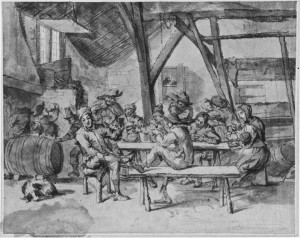Recent scholarship has begun examining the relationship of Caliban and Prospero through the lens of postcolonialism, leading to a discourse that explores this relationship as analogous with that of the colonized and colonizers. This argument aligns Shakespeare’s work in the context of history, applying it directly to actual events. This allegorical reading explores the nuances of Caliban being abused by Prospero after introducing him to the island and the way that aspects of physical abuse and use of language work in ways to oppress Caliban as parallel to that of European powers colonizing Africa and the “New World”. Continue reading
Author Archives: Angela Noppenberger
Keep the Government out of the Bedroom
In Shakespeare’s Measure for Measure there exists a paradox of the punishment of fornication only being able to be lifted by more fornication. I am referring to the deal that Angelo attempts to make with Isabella, her virginity for her brothers freedom. This issue, however, is reflective of a greater anxiety of the state invading personal spaces. From Claudio’s arrest to the loss of Mistress Overdone’s livelihood to the bargaining of Isabella’s virginity, the destructiveness of the state’s involvement with matters concerning sex as an anxiety of the play is evident. Continue reading
Foreseen Destruction: A Moral in Troilus and Cressida
Troilus and Cressida does not fit quite neatly into Shakespeare’s collected works. It is filled with bawdy humor, but not a comedy. The ending is tragic, but the characters written so unlikable that a sympathetic audience is hard to find. There is a historical element, but the play’s namesakes are doomed lovers that would have no lasting effect on British history. Why write a play so steeped in inevitable doom? I believe there is merit in discussing the way the play is written as a means to deliver a message as opposed to entertaining an audience. Continue reading
Wrestling in As You Like It
Cynthia Marshall discusses the wrestling scene of As You Like It as it plays into the school of thought that the play is not one of simple light-hearted comedy. As lenses such as feminism and the questioning of social statuses are introduced into scholarly dialogue, the heavier themes of Shakespeare are being extrapolated (Marshall 265). The themes of fratricide and the anxiety of fissures within families, social implications of lineage and gender stability can be explored through interpretations of the wrestling match. The wrestling match also brings to light the idea of the lines between reality and performance blurring in a way that brings the anxieties of the play closer to the audience. Continue reading
The significance of the tavern
The tavern scenes in Henry IV Part I are set in stark contrast to those that take place in the room’s of royalty and the battlefield. Hal’s lower class friends are not so concerned with the overthrowing of monarchs or war strategy. Pranks and hearty eating are much higher on the list of priorities at the tavern in Eastcheap. Why would Shakespeare include such debauchery in one of his histories praising the rise of the current royal bloodline? Harry’s time in the taverns is important in creating a more dynamic, more relatable depiction of England. It also creates a space removed from the drama of the royals and war where Harry and can temporarily escape to. Just as importantly, when Harry leaves the tavern, the heavy reality and role into which he was born can be fully appreciated. Continue reading
Bassanio’s Sexuality
Bassanio’s sexuality can be examined and scrutinized despite his seemingly heteronormative actions and intentions. The homoerotic undertone of Antonio and Bassanio’s relationship is easily discussed by analyzing the dedication and declarations of love by Antonio because he does not have a heterosexual romantic relationship to counteract against his love for Bassanio. Bassanio’s commitment to Portia, however, does not dictate his sexuality or establish his heterosexuality. Remembering that Bassanio’s relationships take place during a time when homosexuality is a sin and a punishable crime, the audience can translate Bassanio’s actions as the actions of one who is assumed heterosexual by societal default. His attraction to Portia is not being dismissed just because he is not heterosexual. Instead, modern audiences can discuss the idea of bisexuality or a fluid sexuality. Continue reading
Shakespeare (not so) in Love
In Shakespeare’s A Midsummer Night’s Dream, Lysander delivers the line, “The course of true love never did run smooth” (I.1, 134). He is referring to his own romantic complications in regards to marrying Hermia. This line, however, very aptly describes all the romantic relationships in the play. There is nary a functional relationship to be found. Continue reading

